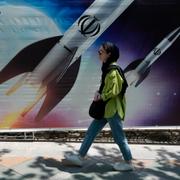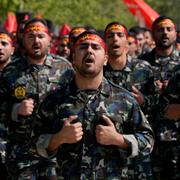Ärkefienderna Israel och Iran
Wikipedia (en)
The relations between Iran and Israel are divided into four major phases: the ambivalent period from 1947 to 1953, the friendly period during the era of the Pahlavi dynasty from 1953 to 1979, the worsening period following the Iranian Revolution from 1979 to 1990, and the ongoing period of open hostility since the end of the Gulf War in 1991. In 1947, Iran was among 13 countries that voted against the United Nations Partition Plan for the British Mandate of Palestine. Two years later, Iran also voted against Israel's admission to the United Nations.
Iran was the second Muslim-majority country to recognize Israel as a sovereign state after Turkey. After the 1953 coup d'état, which reinstalled the pro-Western leader Mohammad Reza Pahlavi as the Shah of Iran, relations between the two countries significantly improved.
After the 1979 Islamic Revolution, Iran severed all diplomatic and commercial ties with Israel, and its theocratic government does not recognize the legitimacy of Israel as a state. The turn from cold peace to open hostility began in the early 1990s, shortly after the collapse of the Soviet Union and the defeat of Iraq in the Gulf War, after which relative power in the Middle East shifted to Iran and Israel. The conflict escalated in the early 1990s, as Yitzhak Rabin's government adopted a more aggressive posture on Iran. Rhetorical conflict heated up during the presidency of Mahmoud Ahmadinejad, who made inflammatory statements against Israel. Other factors that have contributed to the escalation of bilateral tensions include Iran's development of nuclear technology relative to Israel's long-stated Begin Doctrine, Iran's funding of Islamist groups such as Hezbollah, Palestinian Islamic Jihad and Hamas, as well as alleged involvement in terrorist attacks such as the 1992 attack on Israeli embassy in Buenos Aires and the 1994 AMIA bombing, and Israel's alleged support for militant groups such as the People's Mujahedin of Iran and Jundallah as well as alleged covert Israeli operations in Iran including multiple assassinations and bombings.
Since 1985, Iran and Israel have been engaged in an ongoing proxy conflict that has greatly affected the geopolitics of the Middle East, and has included direct military confrontations between Iranian and Israeli organizations, such as in the 2006 Lebanon War. The conflict has played out in various ways, including through support for opposing factions in conflicts in Syria and Yemen. Iran has provided support to the Syrian government, while Israel has supported opposition groups. In Yemen, Iran has provided support to the Houthi rebels, while Israel has provided support to the Saudi-led coalition fighting the rebels. The conflict has also involved cyber attacks and sabotage against each other's infrastructure, including attacks on nuclear facilities and oil tankers. Overall, the Iran-Israel proxy conflict is a complex and ongoing conflict that has had a significant impact on the political and security dynamics of the Middle East.



